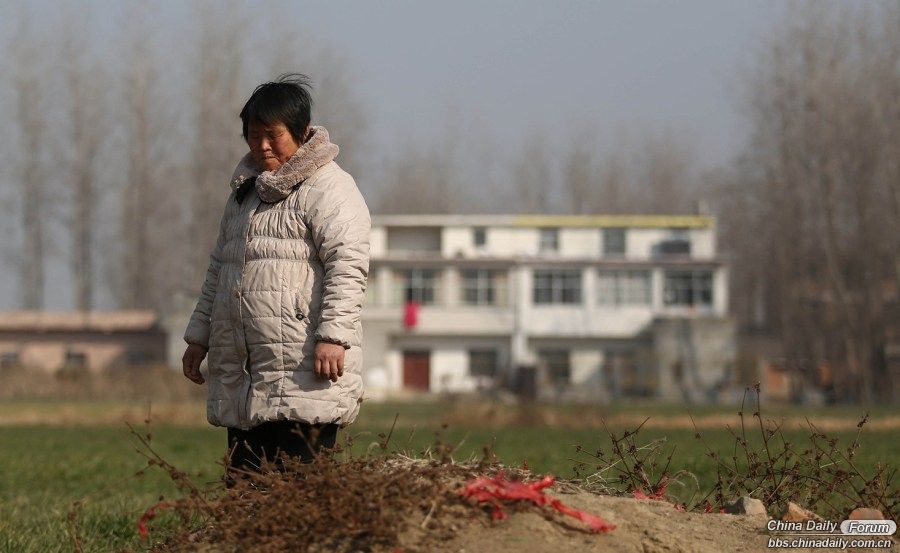Boy commits suicide to save uremic brother
china.org.cn / chinagate.cn by Chen Boyuan, January 28, 2014 Adjust font size:
| Gao Hongtao, a teenager uremic young man, commits suicide to save his elder brother, who also has the disease. His mother was at the grave. [photo / China Daily] |
No one knows whether Gao Hongtao had a lingering attachment for life before he committed suicide.
His suicide note, which explained his final thoughts, reads: "Now that I am gone, my brother will have a better chance of getting cured." Like the 18-year-old boy, his brother Gao Honghui, two years older, also suffered from uremia.
At the end of his suicide note, the boy wrote: "Brother, let me know when your disease is cured. I will be happy for you."
Gao Hongtao's final year was difficult. Apart from physical pain and economic pressure, he had no hope of being cured. The enthralling hopelessness prompted him to end his life by drinking pesticides.
Now the elder brother is in recovery after a successful kidney transplant, but can hardly feel happy. He often says, "If my brother were alive, would I have been happier after the transplant."
Telepathic omen
On the morning of July 23, 2011, Gao Honghui, the elder brother who was receiving dialysis treatment at a hospital in Hefei, the capital of Anhui Province, felt a sudden palpitation. The sign made his father, Gao Chuanyou, feel anxious, because it was usually the younger boy who did not feel well during dialysis.
Later that day, as he received a phone call from the younger son's landlord, he realized it was "telepathy between the brothers." On the phone, the landlord said, "Come over as soon as possible. Your child has died."
A four-hour bus journey took Gao Chuanyou to his son's rented apartment in Funan, a city near the family's rural home town. The younger brother chose to be treated there instead of in a provincial hospital so as to ease his parents' financial burden.
In the room, which was on the fourth floor of a dark, dusty building, the father found his son lying still on the bed, looking serene. His hands were crossed over his stomach, and his left leg was dangling from the bed, touching the floor. Beside him, an electric fan was still running and a second hand black smart phone, which the boy paid 80 yuan (US$13.22) for, was still on charge.
Gao Chuanyou wished his son was only asleep but the boy's pale face and cold body dragged him back to reality - his son was dead.
"Dad and mom, please cure my brother. I left you not because I didn't want to be treated, but because our family was too poor. I miss home. I miss my school. Brother, please keep taking your medication. Let me know when you are cured so that I can be happy," the boy's suicide note read.
"There was a strong pesticide smell, like of the pesticide DDVP, coming from his body," Gao later told the press. He said he searched the front and back yards of the building, besides the room, and could not find the empty pesticide bottle.
On the same evening, Gao properly buried his son just outside their village home. He did not call the police, fearing that police involvement would draw the public's attention to the suicide, which would make the room hard to lease.



